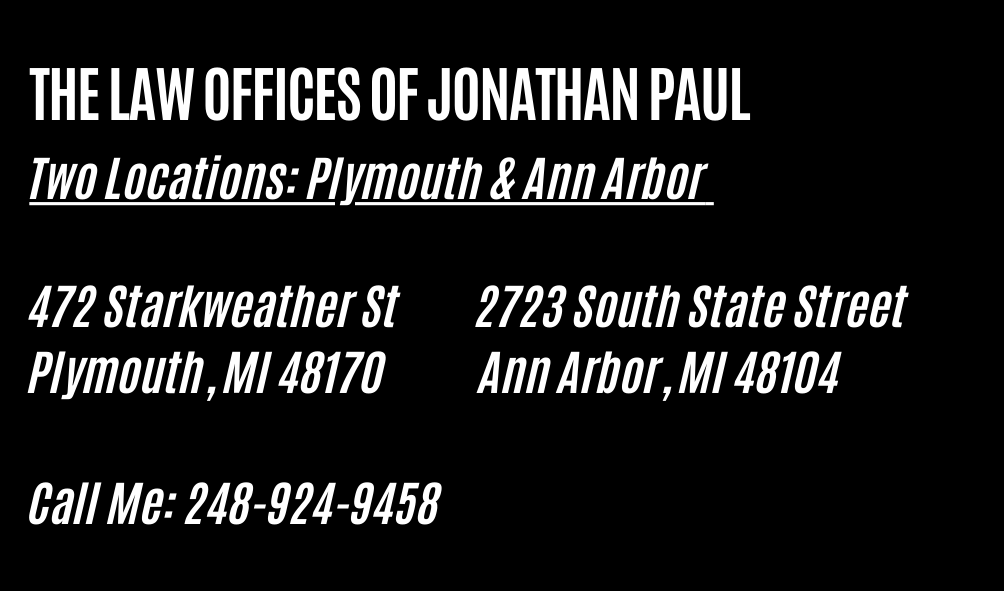An Approach Grounded in Empathy and Understanding
Legal challenges are often accompanied by a whirlwind of emotions and uncertainties. Led by attorney Jonathan Paul, our firm aims to bring clarity and a sense of direction to those navigating the maze of the legal system. We view our clients not as "criminals," but as individuals in need of experienced guidance and representation. This blog post focuses on the topic of Malicious Destruction of Property (MDOP) as it relates specifically to cases in the 47th District Court, which serves Farmington Hills, Michigan.
Key Components of an MDOP Charge in Michigan
For a conviction on an MDOP charge, the prosecution has the burden to prove the following elements:
Levels of Offenses and Associated Penalties
In cases where multiple incidents involve the same parties within a 12-month timeframe, the prosecution may aggregate these to assess the total value, which is based on "fair market value."
The Importance of Intent
MDOP is classified as a specific intent crime in Michigan. That means if you didn’t act with the intention to cause damage, it’s possible that you could be found not guilty.
Mitigating Circumstances and Options
Often, MDOP charges can be negotiated to lesser charges if the defendant agrees to compensate the victim for their loss. Full restitution can sometimes even result in a felony charge being reduced to a misdemeanor.
Taking Control of Your Case
Being charged with MDOP is a critical moment that demands prompt and thoughtful action. You have the ability to affect the outcome of your case, especially when guided by an experienced Michigan criminal defense attorney familiar with the nuances of the 47th District Court.
Legal challenges are often accompanied by a whirlwind of emotions and uncertainties. Led by attorney Jonathan Paul, our firm aims to bring clarity and a sense of direction to those navigating the maze of the legal system. We view our clients not as "criminals," but as individuals in need of experienced guidance and representation. This blog post focuses on the topic of Malicious Destruction of Property (MDOP) as it relates specifically to cases in the 47th District Court, which serves Farmington Hills, Michigan.
Key Components of an MDOP Charge in Michigan
For a conviction on an MDOP charge, the prosecution has the burden to prove the following elements:
- The property in question belonged to someone other than the defendant.
- The defendant intentionally caused damage or destruction to that property.
- The act was carried out knowingly and without a justifiable reason.
- The monetary value of the damage has to be established to determine the severity of the charges.
Levels of Offenses and Associated Penalties
- Damage below $200 will result in a 93-day misdemeanor.
- Damage ranging from $200 to $1,000 is categorized as a one-year misdemeanor.
- Damage that exceeds $1,000 but is less than $20,000 is considered a felony.
- Damage that goes beyond $20,000 leads to a more severe felony charge with extended jail time.
In cases where multiple incidents involve the same parties within a 12-month timeframe, the prosecution may aggregate these to assess the total value, which is based on "fair market value."
The Importance of Intent
MDOP is classified as a specific intent crime in Michigan. That means if you didn’t act with the intention to cause damage, it’s possible that you could be found not guilty.
Mitigating Circumstances and Options
Often, MDOP charges can be negotiated to lesser charges if the defendant agrees to compensate the victim for their loss. Full restitution can sometimes even result in a felony charge being reduced to a misdemeanor.
Taking Control of Your Case
Being charged with MDOP is a critical moment that demands prompt and thoughtful action. You have the ability to affect the outcome of your case, especially when guided by an experienced Michigan criminal defense attorney familiar with the nuances of the 47th District Court.









